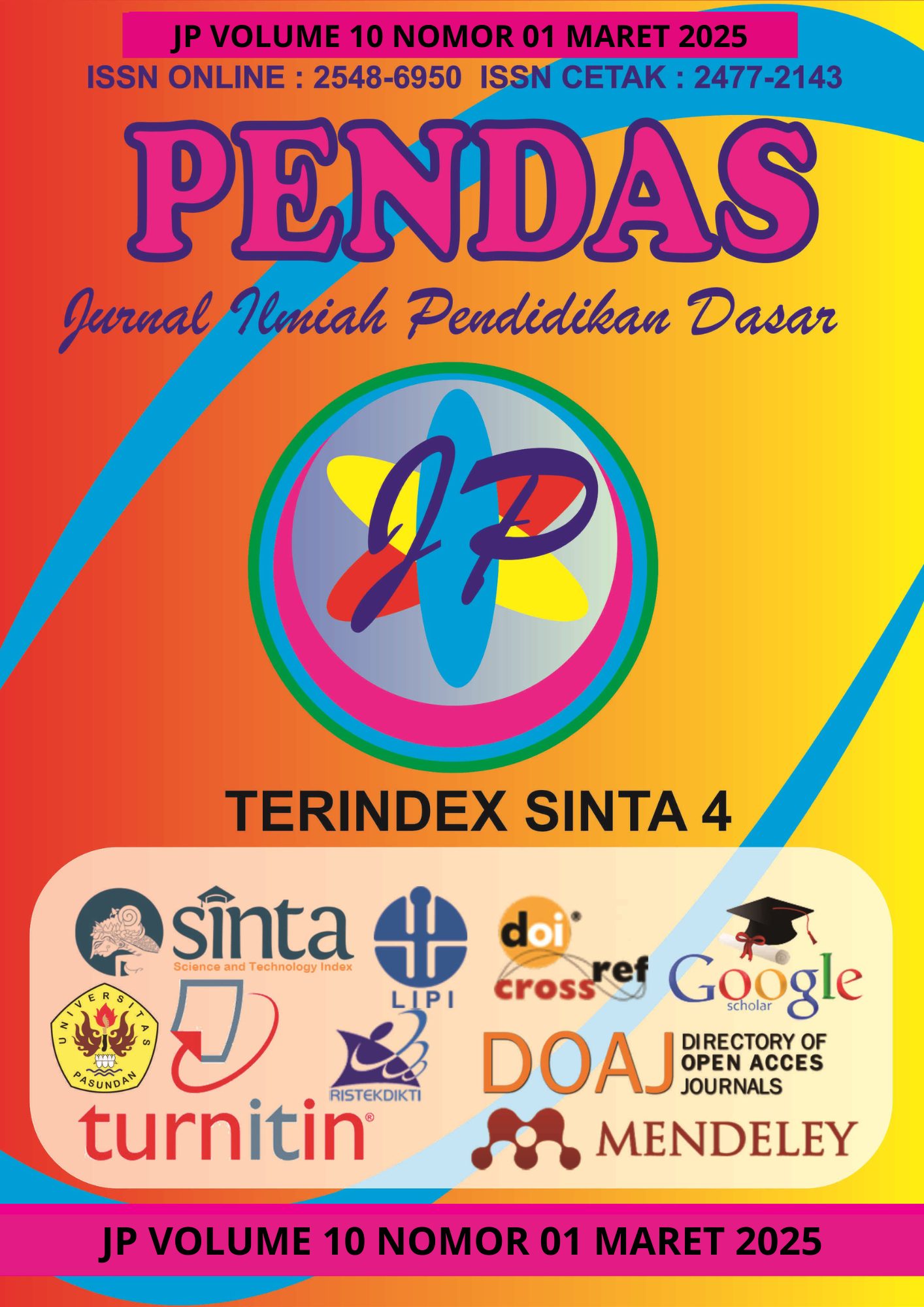PENGARUH KECEMASAN MATEMATIKA TERHADAP PRESTASI BELAJAR SISWA KELAS IV SEKOLAH DASAR
DOI:
https://doi.org/10.23969/jp.v10i01.22188Keywords:
math anxiety, academic performance, elementary school studentsAbstract
Penelitian ini bertujuan untuk mengkaji pengaruh kecemasan matematika terhadap prestasi belajar siswa kelas IV sekolah dasar di Gugus Untung Suropati, Ambal, Kebumen. Dengan pendekatan kuantitatif dan metode survei, penelitian ini melibatkan 101 siswa yang dipilih menggunakan teknik proportional random sampling. Data diperoleh melalui angket kecemasan matematika dan tes prestasi belajar. Hasil analisis menunjukkan bahwa kecemasan matematika memiliki pengaruh negatif signifikan terhadap prestasi belajar siswa, yang ditunjukkan dengan persamaan regresi Y = 85,637 – 0,398X. Temuan ini menegaskan pentingnya intervensi yang efektif untuk membantu siswa mengurangi kecemasan dan meningkatkan prestasi belajar.
Downloads
References
Ashcraft, M. H., & Krause, J. A. (2007). Working memory, math performance, and math anxiety. Psychonomic bulletin & review, 14(2), 243–248. https://doi.org/10.3758/BF03194059
Commodari, E., & La Rosa, V. L. (2021). General academic anxiety and math anxiety in primary school. The impact of math anxiety on calculation skills. Acta Psychologica, 220, 103413. https://doi.org/10.1016/j.actpsy.2021.103413
Fan, X., Hambleton, R. K., & Zhang, M. (2019). Profiles of mathematics anxiety among 15-year-old students: A cross-cultural study using multi-group latent profile analysis. Frontiers in Psychology, 10. https://doi.org/10.3389/fpsyg.2019.01217
Khatoon, T., & Mahmood, S. (2010). Mathematics anxiety among secondary school students in India and its relationship to achievement in mathematics. European Journal of Social Sciences, 16, 75–86.
Krinzinger, H., Kaufmann, L., & Willmes, K. (2009). Math anxiety and math ability in early primary school years. Journal of Psychoeducational Assessment, 27(3), 206–225. https://doi.org/10.1177/0734282908330583
Mustaqim, A., & Budiharti, B. (2024). Pengaruh Kemandirian Belajar terhadap Prestasi Belajar Matematika Siswa Kelas IV di Sekolah Dasar. Jurnal Basicedu, 8(2), 1112–1120. https://doi.org/10.31004/basicedu.v8i2.7278
Pérez-Fuentes, M. D. C., Núñez, A., del Mar Molero, M., Gázquez, J. J., Rosário, P., & Núñez, J. C. (2020). The role of anxiety in the relationship between self-efficacy and math achievement. Psicologia Educativa, 26(2), 137–143. https://doi.org/10.5093/PSED2020A7
Ramirez, G., Gunderson, E. A., Levine, S. C., & Beilock, S. L. (2013). Math Anxiety, Working Memory, and Math Achievement in Early Elementary School. Journal of Cognition and Development, 14(2), 187–202. https://doi.org/10.1080/15248372.2012.664593
Riboroso, R. A., Llagas, R. M., & Taan, J. L. R. (2018). Mathematics Self Efficacy and Anxiety and Mathematics Performance of Elementary Education Students. International Journal of Scientific & Engineering Research, 9(11), 671–687.
Richardson, F. C., & Suinn, R. M. (1971). THE MATHEMATICS ANXIETY RATING SCALE : PSYCHOMETRIC DATA university counseling center indicated that their problem centered around mathematics anxiety ( Suinn , 1970 ). The Mathematics Anxiety Rating Scale ( MARS ) was con- structed to provide a measure o. 18(6), 6–9.
Downloads
Published
Issue
Section
License
Copyright (c) 2025 Pendas : Jurnal Ilmiah Pendidikan Dasar

This work is licensed under a Creative Commons Attribution 4.0 International License.














































